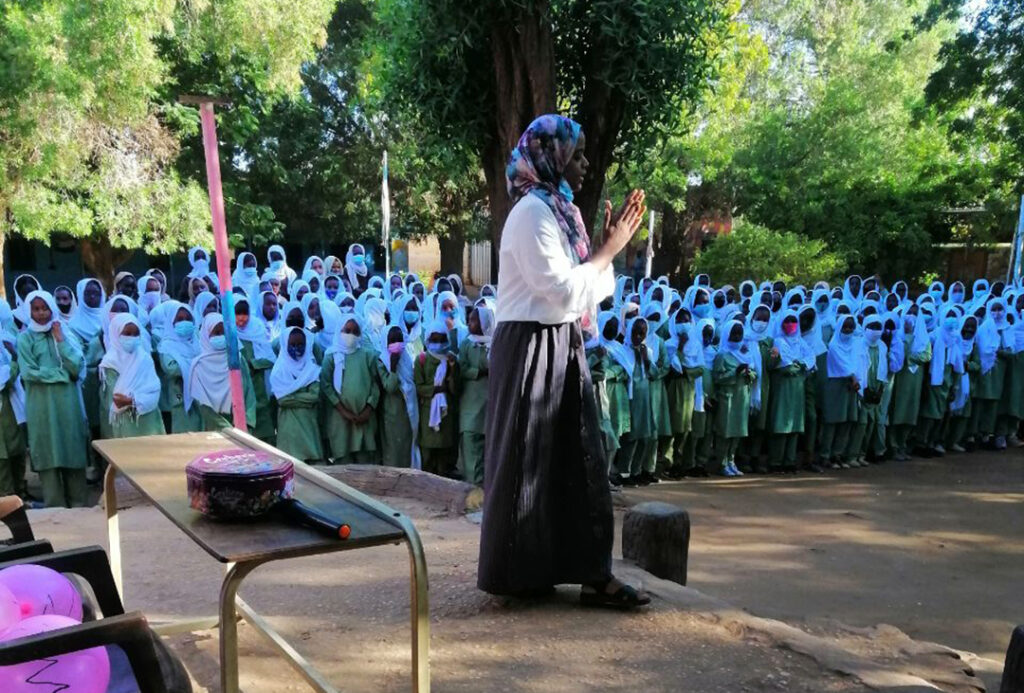ADF STAFF
When two Sudanese doctors living in the United States took action to help their homeland during the pandemic, they knew it was just the start of a longer journey.
One year after launching their project with medical students in Sudan, called the Community Medical Response Team (CMRT), Dr. Nada Fadul of the University of Nebraska and Dr. Reem Ahmed of Emory University in Georgia have expanded the team’s focus to primary health care throughout the country.
The change came directly from community engagement.
“During community visits we noticed that there were vast unmet needs in the community when it comes to primary health care,” Fadul told ADF, adding that visits include preventive care treatment, chronic disease management and health awareness activities.
Fadul, Ahmed and other experts around the world conducted virtual mentoring and training sessions with 40 students working in Sudan as trainers for a larger team of 150 volunteers who implemented the program, neighborhood by neighborhood.
Ahmed said a critical component of their success has been a collaboration with Project ECHO, a virtual mentorship platform that CMRT uses as its main knowledge exchange between subject matter experts and students.
“That’s the beauty of the virtual experience, utilizing technology and social media to deliver something like this,” she told ADF in 2021. “I see the great benefit of it. The students are also wonderful about using these technologies. Actually, I’m learning from them.”
With COVID-19 cases waning since a major spike from October 2021 through February 2022, the evolution of the CMRT was inevitable.
Ahmed saw the potential when she visited Sudan.
“When we started this project, my mind was set on how to help with the pandemic,” she said. “Now when I see these students so very motivated, it’s blown my mind. The CMRT is something that will give them a start. They can take it upon themselves to establish themselves as true leaders, and I see this happening.
“My role is to provide a helping hand to the younger generation to utilize their skills. They have wonderful energy.”
The CMRT uses community members to promote trust with health care providers, and medical students deliver the CMRT’s services, including clinics and health care awareness.
“While the medical students benefited the community greatly from providing education and access to services that were not readily available for these communities, the students have also benefited greatly from the direct community engagement, which broadened their understanding of health care beyond the traditional health care settings,” Fadul said.
“This also helped them get a practical understanding of social determinants of health and the interplay between individual and community health.”
Of course, there have been challenges in a country that has been torn apart by political and ethnic violence.
The CMRT has had to navigate between the Ministry of Health, the ruling military junta and the resistance committees who regularly demonstrate against the coup leaders.
“Community engagement relies heavily on partnering with stakeholders and trusted leaders in the community such as the resistance committee,” Fadul said. “We have had to navigate carefully and remain focused on health care needs of these communities at a time when these leaders were heavily occupied by the pursuit of justice and democracy.
“We faced several sociopolitical obstacles that made us change our course.”
Still, she is heartened by the energy and enthusiasm of Sudanese youth and what she sees as their commitment to rebuilding the country’s health care system.
Fadul and Ahmed also have been encouraged to see the CMRT help break the international academic isolation that Sudan has dealt with for decades.
Along the way, the CMRT’s inroads and successes have been a source of gratification and hope.
“The resilience that made this work succeed in spite of all the turmoil is the same resilience that will help Sudan see the light at the end of the tunnel,” Fadul said.


1 Comment
Teaching is the greatest act of optimism. God bless you for the work your doing. Please do a documentary showcasing the work your doing.
I am a documentary journalist based in Kenya. I can help.